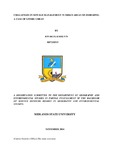Please use this identifier to cite or link to this item:
https://cris.library.msu.ac.zw//handle/11408/2126Full metadata record
| DC Field | Value | Language |
|---|---|---|
| dc.contributor.author | Kwakukai, Kelvin | - |
| dc.date.accessioned | 2017-06-22T15:12:38Z | - |
| dc.date.available | 2017-06-22T15:12:38Z | - |
| dc.date.issued | 2014-11 | - |
| dc.identifier.uri | http://hdl.handle.net/11408/2126 | - |
| dc.description.abstract | The scope of sewage management has evolved throughout history with changes in the socio-economic conditions, city structures and the environmental concern. The major thrust of this paper is to assess challenges faced in sewage management in urban areas of Zimbabwe using Gweru urban as a case study. The researcher employed cluster sampling to distribute 60 questionnaires in two clusters. In gathering information the researcher used questionnaire, interviews, observations and secondary data. Questionnaires were used to gather information from the residents relating to effects of improper sewage management and all other relevant data on challenges faced in sewage management. Semi structured interviews with key informants were conducted to compliment information obtained using questionnaires as interviews were done with specialists in the field of sewage management. Observations and discussions assisted the researcher to expose the evidence on the ground. Major findings from the research include obstacles like sanitary pads, pampers, condoms as key cause in sewage blockages. Furthermore, the research also confirms that, most of the residents are not aware of the effects of improper sewage management. Such data is supported by information from direct observations where litter was found everywhere. The research also highlighted some of the major challenges faced in sewage management which vary from individual household to the local authority. Most individuals’ challenges are shortage of capital and lack of bins for proper waste disposal. The local authorities also suffer from transport shortages and capital. Environmentally sustainable solid waste management practices guided by the principles of the integrated approach and revitalized by environmental education must be fully adopted. The researcher edged residents to avoid ignorance especially on issues like sewage management which actually affects them directly or indirectly. The researcher however, recommends for multi-stakeholder participation and contributions if challenges faced in sewage management are to be contained. | en_US |
| dc.language.iso | en | en_US |
| dc.publisher | Midlands State University | en_US |
| dc.subject | Sewage management | en_US |
| dc.title | Challenges in sewage management in urban areas of Zimbabwe: a case of Gweru urban | en_US |
| item.fulltext | With Fulltext | - |
| item.languageiso639-1 | en | - |
| item.grantfulltext | open | - |
| Appears in Collections: | Bsc Geography And Environmental Studies Honours Degree | |
Page view(s)
176
checked on Feb 27, 2026
Download(s)
158
checked on Feb 27, 2026
Google ScholarTM
Check
Items in MSUIR are protected by copyright, with all rights reserved, unless otherwise indicated.




